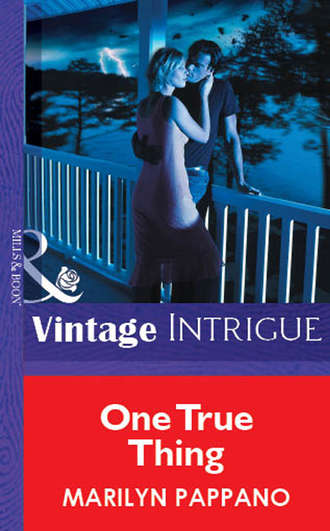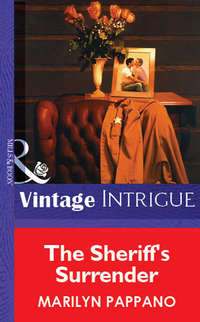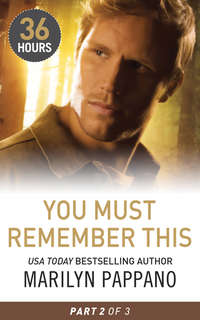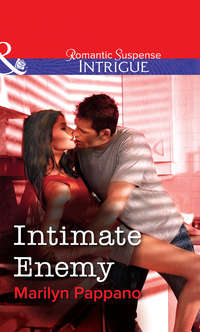
Полная версия
One True Thing

For the first time in three years, Cassidy was having a few hopes.
At least, she thought that was what the quivery, anticipatory, apprehensive feelings in her gut were. She’d been without hope for so long, though, she couldn’t be sure.
It would be foolish to start hoping again, she chastised herself. So what if she’d been safe and happy at Buffalo Lake? So what if she’d let other people into her life, even on the most superficial basis, for the first time in three years? So what if some of those people seemed to genuinely like her—like Jace? She couldn’t stay. Sooner or later, something would happen. Jace would get tired of asking questions and start snooping into the stories she’d told him. And sooner or later, he’d want to know why Cassidy McRae didn’t really exist.
One True Thing
Marilyn Pappano

www.millsandboon.co.uk
MARILYN PAPPANO
brings impeccable credentials to her career—a lifelong habit of gazing out windows, not paying attention in class, daydreaming and spinning tales for her own entertainment. The sale of her first book brought great relief to her family, proving that she wasn’t crazy but was, instead, creative. Since then, she’s sold more than forty books to various publishers and even a film production company. You can write to her at P.O. Box 643, Sapulpa, OK, 74067-0643.
Contents
Prologue
Chapter 1
Chapter 2
Chapter 3
Chapter 4
Chapter 5
Chapter 6
Chapter 7
Chapter 8
Chapter 9
Chapter 10
Chapter 11
Chapter 12
Epilogue
Prologue
“I wish you would reconsider.”
Jace Barnett didn’t look up from the desk he was cleaning out. He didn’t need to see to know it was Tim Potter who stood on the other side. The captain had tried to stop him when he left the disciplinary hearing, but Jace had gotten away without speaking to him. He’d known his luck wouldn’t hold until he left the building, but after the hearing, he just hadn’t given a damn.
“You caught a bad break, Jace—”
He shoved the drawer shut and began gathering the few items on the desktop. “A bad break? I didn’t do anything wrong, but the department hung me out to dry anyway because it was politically expedient.” He loaded the last two words with every bit of the disgust he felt for them, for the higher-ups who’d sat in judgment of him, for the machine that had sacrificed him for the chief’s greater good.
“I know,” Potter said, his tone as conciliatory as Jace’s wasn’t. “You got a raw deal, and I swear, we’ll make it up to you. But that’s going to be hard if you go crawling off with your feelings hurt.”
The only personal item remaining on the desk was a photograph taken two months earlier. The Barnett clan at Thanksgiving—his parents, Ray and Rozena; his uncle Del and aunt Lena; his cousin Reese and his wife, Neely. Jace stood in the middle with Amanda, his arm around her shoulders. She was gone now, part of the fallout of his “raw deal.” She’d liked cops in general and him in particular, but not after the suspension. Not once he’d become the target of a very public and negative witch-hunt. Last he’d heard, she was seeing some detective in Vice, and she was in love.
He hoped the vice cop had a more realistic understanding of what that meant than he’d had. He’d believed her—had even been planning to ask her to marry him once this mess was over. He’d been a first-class sucker.
He put the photo in his gym bag, then stood and met Potter’s gaze. “I’m not crawling off. I’m getting the hell out.”
“But, Jace— A couple more years and you can retire. You don’t want to give that up.”
Jace switched the gym bag to his other hand, scooped his coat off the desk and headed for the door. “Screw retirement. Screw the job. Screw you all.” Just like they’d screwed him.
He was almost outside when Potter caught his arm. “Forget the resignation, Jace. We’ll consider this a temporary leave of absence. Take some time to cool off and think about it clearly.”
He’d had nothing to do but think since they’d pulled him off the job weeks ago. He’d thought until he was sick of it, and he’d always reached the same conclusion. It was time to get out. If this treatment was the best the Kansas City Police Department could do for one of its wronged veteran detectives, he no longer wanted to be a part of it.
It had begun snowing while he was inside. He stopped, pulled on his coat and gloves, then opened the door. Frigid air along with a few flakes rushed inside as he looked back at Potter. “I’ve given this department my best for more than fifteen years—my dedication, my loyalty, my support—and the first time I need some of it back, you tell me to bend over and take it quietly, then get back to the job as if nothing happened. Well, Captain, it ain’t gonna happen. I’m outta here.”
He stepped out into the snow and headed for his truck. Potter stepped out after him, but didn’t speak. When Jace pulled away from the curb, the captain was still standing there, snow coating his gray hair and shoulders.
His fingers tight around the steering wheel, Jace headed for his apartment. He’d been a damned fool. All along he’d believed today’s hearing would exonerate him. The suspension, the investigation, being yanked off his cases—that was all routine whenever allegations of wrongdoing were made against an officer. He’d hated it, but he’d been positive everything would turn out in his favor. Hell, he’d done nothing wrong.
Except believe in the department and the people he’d worked with.
Except think that seventeen years of outstanding service counted for something.
Except assume that the truth actually counted for something.
Today he’d learned better. The police chief had a run for the governor’s office in mind, and justice for one detective stood little chance against his ambitions.
Seventeen years patrolling the streets, working Homicide and Sex Crimes and Narcotics, seventeen years of dealing with scum, working long hours for too little pay, facing danger more often than he wanted to recall, and this was the thanks he got. Sacrificed for the benefit of the chief’s public image.
He was only a few blocks from the apartment when he saw a car at the side of the road. Its right wheels were in a ditch, its headlights pointed up and illuminating the snow that darkened the afternoon. A woman stood near the rear of the car, huddled in her coat and looking helplessly at the vehicle. Automatically he eased his foot off the gas and switched on his blinker to pull onto the shoulder.
Deliberately he shut off the blinker and pressed the gas pedal down instead.
He was out of the help-giving business.
Forever.
Chapter 1
Slow as molasses in winter, the sun crept across the morning sky, bathing the landscape in bright light so harsh it leached the color from the day. Somewhere in the not-too-far distance, an overly excited canine burst into a frenzied fit of barking and…
Oh, jeez, that sucked. Frowning, Cassidy McRae gazed at the scene in front of her and tried again.
Fat clouds stirred overhead, casting lazy shadows over the forest. A hawk circled, its wings outstretched, its fingerlets rippling in the self-generated breeze, its eagle-eyed gaze searching…
An eagle-eyed hawk? Sheesh.
How about… In the distance, a buck appeared on the verdant lakeshore, its gaze alert and wary as he approached the water for a drink, his impressive antlers casting equally impressive shadows on the smooth glassy surface.
She snorted in much the same way her imaginary buck might. There were many things she couldn’t do in life, and it looked as if turning an evocative phrase was one of them. Calling herself a writer couldn’t make it so, any more than claiming to be a Martian would make that true.
For example, take the scene in front of her. A real writer would be able to describe it in such rich detail that her reader would feel the morning air, soft, still bearing the faint memory of the dawn coolness but growing heavy with the promise of heat. She would smell the clean fragrances of the woods, the lake, the wildflowers blooming in profusion in the tall grass, and she would hear the birdsong, the faint hum of insects and the gentle lapping of the water against the shore.
She, not being a real writer by anyone’s definition, would say the scene was rustic. Very country. More accurately, very un-citylike.
See? She couldn’t even decide for herself what it was.
Besides safe.
Buffalo Lake stretched out to the north and west, still and quiet in the morning. Trees lined the shore—blackjack oaks, cedars, an occasional maple and elm. A mimosa grew to one side, its leaves lacy, its blossoms about to burst into bloom.
The centerpieces of the scene were the cabins, one on each side of the narrow inlet and connected by an aging wooden footbridge. One cottage stood front and center, the other a hundred feet to the south and west. She ignored that one. It was empty, the real-estate agent had told her, and virtually identical to the one in front of her—the one that was going to be her home for the next however many days.
It had been used as a hunting cabin, the agent had told her on the drive out from Buffalo Plains the day before. Cassidy might not have the best imagination around, but she’d translated that into nothing fancy with her first look. Wide brown planks formed the siding, with a brown shingled roof. The window frames and door had once been painted turquoise, but had mercifully faded to a dull sky-bluish shade. There were two chairs on the deck that fronted the house—metal, with contoured seats and backs. At one time they had been a green as hideous as the turquoise, but years of relentless Oklahoma summers had left them dull and faded, too.
This was it. Home—for as long as she felt safe. In the past three years that feeling of safety had proved elusive at best, but maybe this time it would last a whole month. It would be a first, but if there was one thing she’d learned, there was a first time for everything. Love, loss, betrayal, deception, treachery…
The silence, heavy and complete, made her realize how long she’d been sitting in her car. With a fortifying breath, she pulled the keys from the ignition and climbed out.
In the thirty minutes since she’d left the motel in Buffalo Plains, the June heat had become a palpable thing. It created a sheen of perspiration across her forehead and down her arms, and made her clothes cling uncomfortably. She would pretend not to notice, she decided as she unlocked the trunk. She’d been pretending a long time. She was good at it.
Hands on her hips, she gazed into the trunk. Everything she owned was packed here. Her clothes. A laptop computer and printer. Linens and cookware. A few mementos. Every tiny thing that said Cassidy McRae existed, crammed into a space half the size of a small closet.
It was pitifully little.
She slung the laptop case over her shoulder, then hefted the largest of the suitcases before turning from the car. Immediately she froze and the suitcase slid from her fingers. When it landed on the uneven ground, it fell against her leg and leaned there.
A man stood at the near end of the footbridge, his gaze on her. His feet were bare. Heavens, most of his body was bare, except for a pair of faded cutoffs that rode low on his hips.
Mentally she clicked into author mode. The midday sun overhead gleamed on all that exposed skin, adding depth to the rich, warm brown and found highlights in the hair secured in a ponytail with a leather thong, despite the dull matte hue of the black. He looked hostile, she thought with a shiver of apprehension. Dangerous. Savage.
A hot blush that could compete with the blazing sun for intensity warmed her face at that last thought. She couldn’t say for certain, but thought it was probably politically incorrect to describe a Native American as savage, even if it was dead-on accurate. Those flinty black orbs devoid of emotion, that long, hard, lean, muscular body poised to attack, the complete and utter lack of emotion on his ruggedly handsome face….
She gave her head a shake to clear it. The physical description was accurate, if wordy, but the emotional part was way off. He didn’t look the least bit hostile, dangerous or savage. Truthfully he wasn’t so much standing there as lounging, not so much poised to attack as loose and relaxed, and his eyes, brown rather than black, showed a normal amount of friendly curiosity.
His gaze moved over her, shifted to the car, then back. Leaning against the railing with a confidence she wouldn’t display around the silvered wood, he folded his arms across his chest. “It’s a sure bet you’re not one of Junior’s kin,” he said in the accent she was quickly coming to associate with Oklahoma. There had been a time when she’d thought all Okies spoke like Reba McEntire, but two hours in the state had convinced her otherwise. It wasn’t really a drawl, not a twang, not as readily identifiable as a Southern accent or a New Englander’s. It was pleasant, she decided, sounding of the heartland, of cowboys, ranchers, farmers and good-natured, small-town folks.
“Who’s Junior, and how do you know I’m not related to him?”
“Junior Davison. He owns that cabin.” He nodded toward the house behind her. “And I know you’re not related because all the Davison kin have an unfortunate tendency toward red hair, freckles and fat.” His gaze skimmed over her again. “You don’t.”
No, her hair was blond—this week, at least—her skin was freckle-free and her metabolism made short work of the calories she took in. The rest of her life might have been shot to hell, but at least she had a few things to feel grateful for.
Having a neighbor wasn’t one of them.
She stooped to pick up the suitcase again. “No, I’m not related to Junior.”
She made it only a few feet before he spoke again, this time with a hint of a challenge. “Then who are you?”
It was a legitimate question, no matter that it made her stiffen. If the situation were reversed and a complete stranger was moving into the house next to hers, she would at least want to know his name. As remote as these cabins were, she would probably want to know a hell of a lot more than that about him.
Still, when she turned back to answer, it was grudgingly. “Cassidy McRae. I’m renting Junior’s place.” She paused, not wanting to give the impression that she was neighborly, but she was moving in next door to a complete stranger in a remote location. The least she needed to know was what to call her only neighbor for three miles. “Who are you?”
“Jace Barnett. I live there.” He gave a jerk of his head to the house behind him.
“Really. The real estate agent said that place was empty.”
“No matter how often she insists she knows everything, she doesn’t.”
So he was familiar with Paulette Fox. The woman had spoken with great authority on every subject that came to mind, as if every word had come straight to her ear from God’s mouth. Why, she’d lived her entire life in Buffalo Plains and Heartbreak, the wide spot in the road some twenty miles south, and there wasn’t a soul in the county or a thing going on that she wasn’t intimately familiar with.
Except for the rather major fact that the isolated, neighbor-free cabin she’d promised Cassidy was neither as isolated nor neighbor-free as she’d thought.
“Actually, to be fair to Paulette, I just moved out here a couple of months ago. I haven’t seen her since then.”
“Lucky me,” Cassidy murmured.
He pretended not to have heard. “Not that she wouldn’t have lied to you if it meant renting this place. No one’s stayed there in years—not since Junior’s kids put him in the nursing home.”
“Too bad for Junior.”
“Nah, he doesn’t know the difference. His mind’s gone. He doesn’t even know his kids when they come to visit—which isn’t necessarily a bad thing.”
He was probably right, especially when those same kids had seen fit to put their father in a home the minute he’d become trouble. She couldn’t imagine doing such a thing to one of her parents…if she had parents. At least, in the real world.
Shoving away the thought—the regret—she glanced at Jace. “I’ve got to go. I’ve got work to do.” When he showed no intention of returning to his side of the bridge, she deliberately went on. “That’s why I’m here. Not to relax or make small talk with the neighbors. To work.”
Her first lie of the day. There had been a time when the only lies she’d told were harmless little fibs. I love the gift… Yes, that dress looks wonderful on you… The cake was to die for… No, you don’t look like you’ve gained five pounds. Those days were long gone. Now the number of lies she told was limited only by her exposure to people to tell them to. Ask the same question ten times and she would give ten different answers. That was how she lived her life these days.
Correction—that was how she lived, period.
“What kind of work?” Friendly curiosity again.
It shouldn’t have annoyed her, but it did. She wasn’t the type to become chummy with someone just because they happened to live in the same building or on the same block. It had taken some time, but she’d learned not to become chummy with anyone. Leaving wasn’t such a big deal if there was no one special to leave behind.
“The kind that requires a great deal of privacy. Nice meeting you,” she said in a tone that made it clear she’d found it anything but nice. Then she turned toward the house as if she hadn’t just been rude to a friendly stranger. She didn’t look back as she let herself in, and didn’t peek out the window on her way to deposit the computer on the dining table and the suitcase in the bedroom. She did glance toward the bridge when she returned to the car for another load and saw that he’d gone, but not far. He was sitting on his deck in a metal chair that matched her own, a bottle of water in hand, and watching her. She pretended he wasn’t there.
It was harder than it sounded.
Within an hour she’d unloaded and unpacked everything. Cheap aluminum pots and pans, cheaper plastic-handled cutlery, an off-brand boom box with a box of CDs. White sheets and pillowcases, a yellow blanket and a blue print comforter. Clothes that came from Wal-Mart, Kmart and Target, shoes from Payless. Her days of upscale retail experiences were long over. She’d been a world-class shopper, and some days she missed it a lot.
Other days, when she got overwhelmed by the enormity of the life that had been taken from her—twice—she couldn’t care less about shopping.
With nothing left to do, she walked through the cottage, out of the bedroom, past the bathroom and into the living room/dining room/kitchen. “Well, there’s three seconds out of my day,” she said aloud. Only eighty-some thousand to go.
Finally she let herself wander to the window. There was no sign of Jace Barnett. Good. Life was safer without the complication of people.
And lonelier, her inner voice pointed out.
She turned away from the window and gazed around the room. Her monthly two hundred dollars’ rent included furnishings—sofa, chair, coffee and end tables, dining table with three chairs, bed and dresser. All of it was early-impoverished American, all of it ugly enough to make her wonder what in the world the people who’d created it had been thinking. It was a far cry from the leather, stone and luxurious fabrics of her old home, and for one instant it made her want to cry. It was so shabby. Her life was so shabby.
This wasn’t the future she’d envisioned for herself twelve years ago, or five, or even three. She’d intended to follow in the footsteps of every blessed female in her family for generations. She’d planned to be so middle-class, married-with-kids, minivan-PTA-soccer-church-on-Sunday average that she would bore to death anyone who wasn’t just like her.
Odd how easily a little curiosity, greed and bad luck had changed everything.
Her sigh sounded loud and lonesome in the big room, and galvanized her into action. She fixed herself a glass of instant iced tea, then sat at the dining table and opened the laptop. “I am a writer,” she announced as the machine booted up. “I am a writer.”
When she was a yoga instructor, she’d practiced affirmations daily, but it was easier to believe I can do this when “this” was nothing more complicated than the Salute to the Sun routine. Writing a book was a whole other business, and one she knew little about.
“Failure is just another chance to get it right,” she murmured as she clicked on the icon for her word processing program. She had a million such lines. Work is 1% inspiration and 99% perspiration… Whether you think you can or you can’t, you’re right… You can’t win if you don’t play the game… Today is the first day of the rest of your life… If you can dream it, you can do it.
Not one of them helped her when faced with a blank screen. She thought maybe a candy bar would help, so she got up and rummaged through her purse until she found one. Music might help, too, so she detoured past the boom box and put in her favorite Eric Clapton CD. Finding the screen still blank, she decided a few games of Free Cell might get her creative juices flowing.
Two hours later, the screen bore a heading that read Chapter 1 and nothing else. Oh, she’d typed a few lines, then mercifully deleted them. After the third wipeout, her fingers seemed to pick out keys on their own.
I am a writer. I AM a writer. I am a WRITER.
“So write, damn it!” she muttered under her breath.
Frustrated, she pushed away from the table and went to stare out the window, refusing to let her gaze stray to the southwest. The bulk of the lake lay to the north, the rental agent had told her. This section was just God’s afterthought, so it had the peace and quiet Cassidy had told her she needed.
Except for Jace.
She wondered why nosy Paulette didn’t know he was living next door. Why would he want to live all the way out here? Of course, she’d passed houses along the dirt road on her drive out from Buffalo Plains that morning, but mostly they were ranch or farm houses. Naturally someone who earned his living off the land would live here, too.
But the lake was surrounded by thousands of acres of woods. No pasture for livestock, no fields for crops and, as far as she could tell, no other means of support. She would certainly never choose such a place if she had to drive into town to a job every day.
The idea of going to a job every day—the same job—made her melancholy. She’d done that for a lot of years and had never really appreciated it until she’d found herself working for a week here, ten days there—if she was lucky, three weeks someplace else. As soon as she’d learned a job and started to fit in, she’d had to move on. Finally she’d quit fitting in. This time she didn’t intend to even try. She would pass her time here at Buffalo Lake just as she’d passed it at a hundred other places and, when it was up, she would move on, just as she’d moved on from everywhere else.
Just once, though, she would like to settle down, to call the same place home next week and next month and next year. She would like to think in terms of forever instead of right now, to make friends, to have a life…but that was impossible. Like the shark, if she stopped moving, she would die.
But knowing that didn’t ease her longing. It made it a little more bearable, but nothing, she was afraid, would ease it.
Besides death.
Though Jace had gotten his first official job when he was fifteen, he’d been working years longer. His parents had believed that taking care of the house and the livestock was a family responsibility, so he’d started pitching in as soon as he was old enough. He’d worked his way through college, taken three days off after graduation to move to Kansas City, then gone straight to work for the department.







